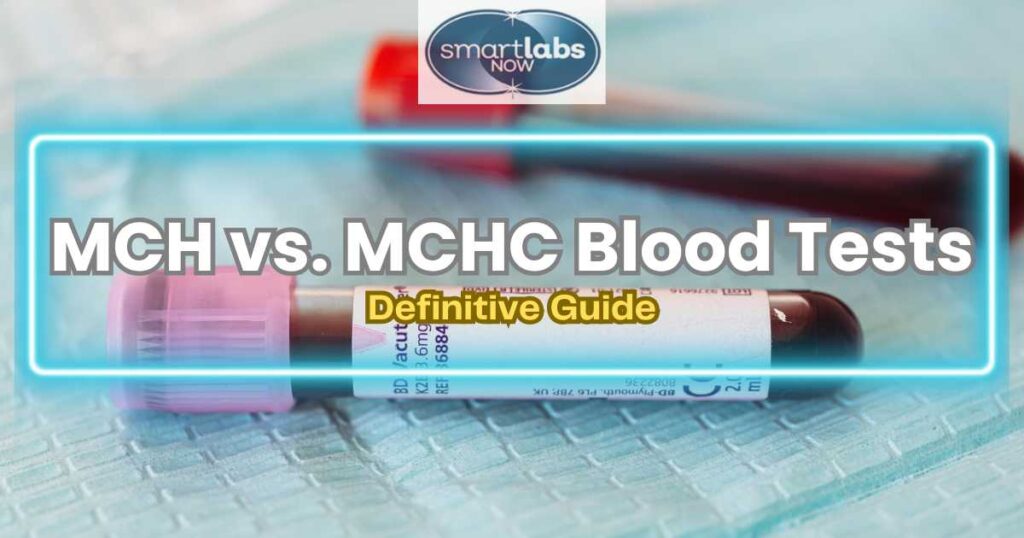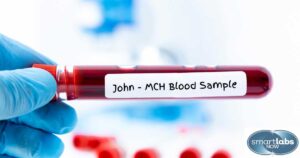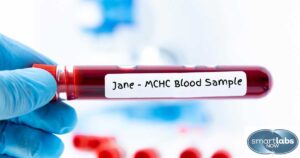
Blood tests are among the most valuable tools doctors use to understand a person’s overall health. Among these tests, MCH (Mean Corpuscular Hemoglobin) and MCHC (Mean Corpuscular Hemoglobin Concentration) provide critical insights into the oxygen-carrying capacity of your red blood cells.
These two measurements are essential because they offer clues about various health conditions affecting the blood, most notably anemia. But the importance of these tests doesn’t stop there.
MCH and MCHC blood test results can reveal much more about your health, including possible nutrient deficiencies, underlying diseases, and how well treatments for these conditions are working.
In this comprehensive guide, we’ll break down everything you need to know about MCH and MCHC blood tests—from what they are to what the results mean for your health.

MCH stands for Mean Corpuscular Hemoglobin. It measures the average amount of hemoglobin inside your red blood cells. Hemoglobin is the protein that allows red blood cells to carry oxygen from your lungs to the rest of your body.
MCH measures how much hemoglobin is in a single red blood cell. This is important because hemoglobin is what enables the red blood cell to carry oxygen.
If your MCH is within the normal range, your red blood cells are likely functioning properly. However, if your MCH is too low or too high, it could indicate a problem with your blood or overall health.
The normal range for MCH typically falls between 27 to 33 picograms (pg) per cell. A picogram is a trillionth of a gram, so MCH measures extremely small quantities.
A low MCH usually indicates that your red blood cells contain less hemoglobin than they should. This condition is often linked to iron deficiency anemia, which means your body doesn’t have enough iron to produce adequate hemoglobin.
Other causes of low MCH may include:
– Thalassemia: A genetic disorder affecting hemoglobin production.
– Chronic diseases: Conditions like chronic kidney disease or inflammatory disorders.
– Blood loss: Significant blood loss can reduce hemoglobin levels.
Symptoms of low MCH can include fatigue, pale skin, shortness of breath, and a general lack of energy.
A high Mean Corpuscular Hemoglobin (MCH) result means that your red blood cells contain an above-average amount of hemoglobin. This is often linked to macrocytic anemia, a condition where red blood cells become abnormally large and carry more hemoglobin than normal.
High MCH can offer significant insights into underlying health issues, prompting further investigation into specific conditions that may be affecting hemoglobin levels and red blood cell production.
People with high MCH may experience symptoms like:
Complete Blood Count (CBC) results, including MCH levels, can offer crucial clues about the body’s oxygen transport efficiency and possible nutrient deficiencies. Reliable resources like Pubmed and others provide access to peer-reviewed studies and clinical insights on blood markers, helping interpret high MCH results with data-backed accuracy.
With the assistance of rigorous data entry services and a robust editorial policy, Smart Labs Now ensures that MCH-related findings are accurate, leveraging the latest studies on conditions ranging from liver disease to pulmonary health.

When MCH levels deviate from the normal range, a variety of management and treatment strategies can help restore balance, depending on the underlying cause. Here’s a look at dietary changes, supplements, and treatments that may be recommended to manage abnormal MCH levels:
Abnormal MCH levels, especially low levels often linked to anemia, can benefit from specific nutrient-rich foods and supplements. Incorporating dark leafy vegetables, such as spinach and kale, provides essential iron, folic acid, and vitamin C to support red blood cell health. Additionally, dietary sources rich in vitamin B6, iron, and fiber promote better nutrient absorption and maintain balanced hemoglobin production.
For those specifically dealing with low MCHC levels, it’s crucial to follow your doctor’s treatment plan which may include taking prescribed medication, making dietary changes, or even getting regular blood transfusions to increase the number of red blood cells.
Since deficiencies in vitamin B12 and folic acid often lead to elevated MCH levels, these nutrients are frequently prioritized in treatment plans. B-12 injections are common for individuals unable to absorb enough from dietary sources, particularly those with chronic conditions or older adults. Folate-rich foods and supplements also play a key role in supporting red blood cell production.
For those with iron deficiency-related low MCHC, iron supplementation may be advised. Iron injections can provide a more immediate boost when dietary intake isn’t sufficient or if gastrointestinal issues impair iron absorption. Pairing iron with vitamin C enhances its absorption, making it more effective. A diet rich in iron, vitamin B12, and folate is essential for the production of hemoglobin.
Exercise can improve your overall health and increase your red blood cell count, while adequate sleep is important for many aspects of your health, including blood cell production. Avoid smoking and excessive alcohol consumption, as these can negatively impact blood health.
Chronic conditions such as kidney and liver disease can impact MCH levels by disrupting red blood cell production. Regular monitoring and a tailored approach—such as managing symptoms of kidney or liver disease alongside MCH treatments—are essential for maintaining healthy levels.
Chemotherapy can affect MCH levels by disrupting bone marrow function, leading to reduced red blood cell production. In such cases, healthcare providers may adjust treatments or recommend supplements like vitamin B6, folic acid, or B-12 injections to mitigate these side effects.
By combining dietary modifications, supplements, and targeted therapies, individuals can work with healthcare professionals to manage MCH and MCHC levels effectively, promoting overall health and well-being.

MCHC stands for Mean Corpuscular Hemoglobin Concentration. It measures the concentration of hemoglobin in a given volume of red blood cells. Unlike MCH, which tells you how much hemoglobin is in each red blood cell, MCHC reveals how concentrated that hemoglobin is within the cells.
MCHC measures the hemoglobin concentration in the red blood cells, which can provide information about the quality of your red blood cells. This measurement helps identify certain types of anemia and other blood disorders.
The normal range for MCHC is typically between 32 to 36 grams per deciliter (g/dL). Anything below or above this range could indicate an underlying health issue.
A low MCHC often points to hypochromic anemia, where red blood cells have less hemoglobin than they should. This makes the cells appear paler than normal, hence the term “hypochromic.”
Causes of low MCHC include:
– Iron deficiency: Just like with low MCH, iron deficiency can lead to low MCHC.
– Chronic blood loss: Long-term blood loss can deplete your body’s iron reserves, leading to a lower concentration of hemoglobin.
– Chronic disease anemia: Some chronic illnesses, such as kidney disease, can affect hemoglobin production.
Low MCHC (Mean Corpuscular Hemoglobin Concentration) can affect your overall health. Here are practical steps to help prevent it:
By following these steps and integrating them into your lifestyle, you can significantly reduce the risk of low MCHC levels and support your overall well-being.
A high MCHC can indicate spherocytosis, a condition where red blood cells are more spherical than disc-shaped, causing them to carry more concentrated hemoglobin.
High MCHC can also occur due to:
– Hereditary conditions: Spherocytosis is often hereditary.
– Autoimmune hemolytic anemia: This occurs when the immune system mistakenly attacks and destroys red blood cells.
High MCHC values are less common than low ones but are still important for diagnosing certain health issues.
Accurate Mean Corpuscular Hemoglobin Concentration (MCHC) measurements are crucial for precise diagnosis and treatment. However, several factors can lead to discrepancies in these results.
Addressing these factors is vital for ensuring reliable MCHC readings, aiding in accurate diagnosis and effective patient care.
The Mean Corpuscular Haemoglobin Concentration, or MCHC, is an important hematology parameter that measures the average concentration of haemoglobin in a given volume of red blood cells. To calculate MCHC, you’ll need to divide the haemoglobin level by the hematocrit value.
The formula to determine MCHC is straightforward:
[ \text{MCHC} = \frac{\text{Haemoglobin} (\text{g/dL})}{\text{Hematocrit} (%)} ]
Let’s break it down with a real-world scenario. Suppose a lab report indicates a haemoglobin concentration of 13.5 g/dL and a hematocrit of 40%.
This result of 33.75 g/dL suggests how much haemoglobin is present in each deciliter of red blood cells.
By understanding and using this calculation, healthcare providers can gain insights into a patient’s red blood cell health and overall oxygen-carrying capacity.

MCH and MCHC are part of a larger blood panel, usually included in a complete blood count (CBC). To perform these tests, a healthcare provider will take a small blood sample, typically from a vein in your arm.
The actual blood draw takes only a few minutes. Results are typically available within 24 to 48 hours.
There are minimal side effects from the blood test. Most people experience a small bruise or soreness at the site of the blood draw, which typically goes away within a day or two.
Undergoing an MCHC blood test is generally very safe. However, it’s important to be aware of some potential minor risks associated with the procedure. Here’s what to expect:
To ensure the smoothest experience possible, adhere to any preparation guidelines given by your healthcare provider. This might include fasting or other specific pre-test instructions. If you have concerns or need further clarification, reaching out to your healthcare provider is always advisable. They can provide personalized advice, ensuring you’re well-prepared and comfortable with the entire process.

The most common causes of low MCH and MCHC include:
– Iron-deficiency anemia
– Chronic blood loss
– Thalassemia
Each of these conditions reduces the hemoglobin content in your red blood cells, leading to a lower oxygen-carrying capacity.
High MCH is often caused by:
– Macrocytic anemia due to B12 or folate deficiency
– Liver disease (potentially leading to cancer)
– Alcoholism
High MCHC, though rarer, could indicate:
– Spherocytosis
– Autoimmune hemolytic anemia
By measuring the amount and concentration of hemoglobin in your red blood cells, MCH and MCHC tests help doctors determine the type of anemia you may have. This information is crucial for developing an effective treatment plan. For example:
– Iron supplements may be recommended if low MCH and MCHC are due to iron deficiency.
– Vitamin B12 or folate supplementation may be necessary if high MCH is due to a deficiency in these nutrients.
After starting treatment, your doctor may use follow-up MCH and MCHC tests to monitor how well the therapy is working. If your levels return to normal, it’s a good indication that the treatment is effective. If not, adjustments may be needed.

While both tests focus on hemoglobin in red blood cells, the key difference is what they measure:
– MCH measures the total amount of hemoglobin in each red blood cell.
– MCHC measures the concentration of hemoglobin in red blood cells.
An MCH test is typically ordered when a doctor suspects anemia or other blood disorders. It’s especially useful in identifying macrocytic and microcytic anemias, where red blood cells are either too large or too small.
An MCHC test is often used alongside the MCH test to provide a fuller picture of your blood health. It’s particularly helpful in diagnosing hypochromic anemias, where red blood cells have less hemoglobin than normal.
Yes, MCH and MCHC are usually ordered together as part of a complete blood count. Together, these tests help doctors identify the underlying cause of anemia and other blood disorders more accurately.
To gain a comprehensive understanding of your blood health, several other tests are often recommended alongside MCHC. These complementary tests provide deeper insights into your blood composition and overall health:
Incorporating these tests provides a thorough assessment, helping healthcare providers pinpoint specific issues and tailor treatment plans effectively.

For men, the normal MCHC range is typically between 32 to 36 g/dL (individual lab ranges may vary).
For women, the normal MCHC range is the same. However, certain conditions like pregnancy may slightly alter these values.
Several factors can affect MCHC levels, including:
Beyond these, other elements can significantly influence MCHC results:
Understanding these factors provides a comprehensive view of what might influence MCHC results, ensuring more accurate diagnostics and patient care.

Beyond anemia, abnormal MCH and MCHC levels can indicate other health problems, including liver disease, kidney disease, and alcohol-related disorders. Monitoring these values can help doctors diagnose these conditions early.
If your MCH or MCHC results are abnormal, it’s important to follow up with your doctor. Abnormal results could point to underlying health issues that need treatment.
The cost of MCH and MCHC tests varies based on your location, insurance coverage, and the lab performing the test. Typically, these tests are included in a routine complete blood count (at Smart Labs Now, we offer it along with several others as part of our ‘Complete Blood Chemistry’ panel 🙌), which can range from $10 to $150 (and more).
There’s usually no special preparation needed for these tests. However, it’s a good idea to inform your doctor about any medications or supplements you’re taking, as some can affect your blood test results.

MCH and MCHC blood tests are crucial in diagnosing and managing anemia and other blood disorders. By measuring the amount and concentration of hemoglobin in red blood cells, these tests offer valuable insights into your overall health.
Whether you’re experiencing fatigue, weakness, or other symptoms, understanding your MCH and MCHC blood test levels can help pinpoint the cause and guide your treatment. Regular testing and follow-ups with your healthcare provider can ensure you’re on the right path to managing your health effectively.
Please consult your primary care physician before engaging with any pharmaceutical, natural substances, or activity regimens mentioned or prescribed in this post. Smart Labs Now is not responsible for any health or life outcomes resulting from the use of the information or recommendations provided. This account does not serve as a substitute for professional medical advice.